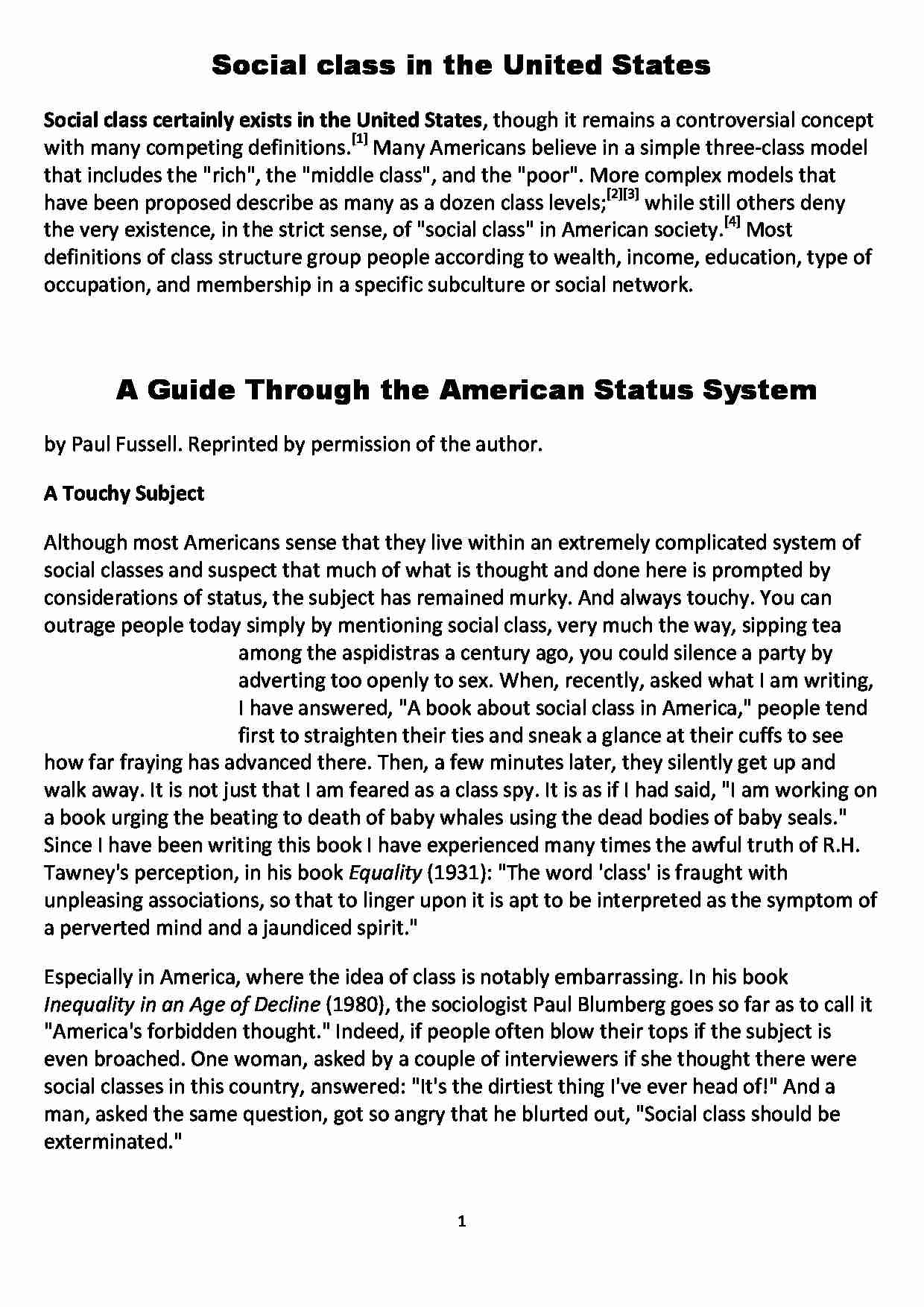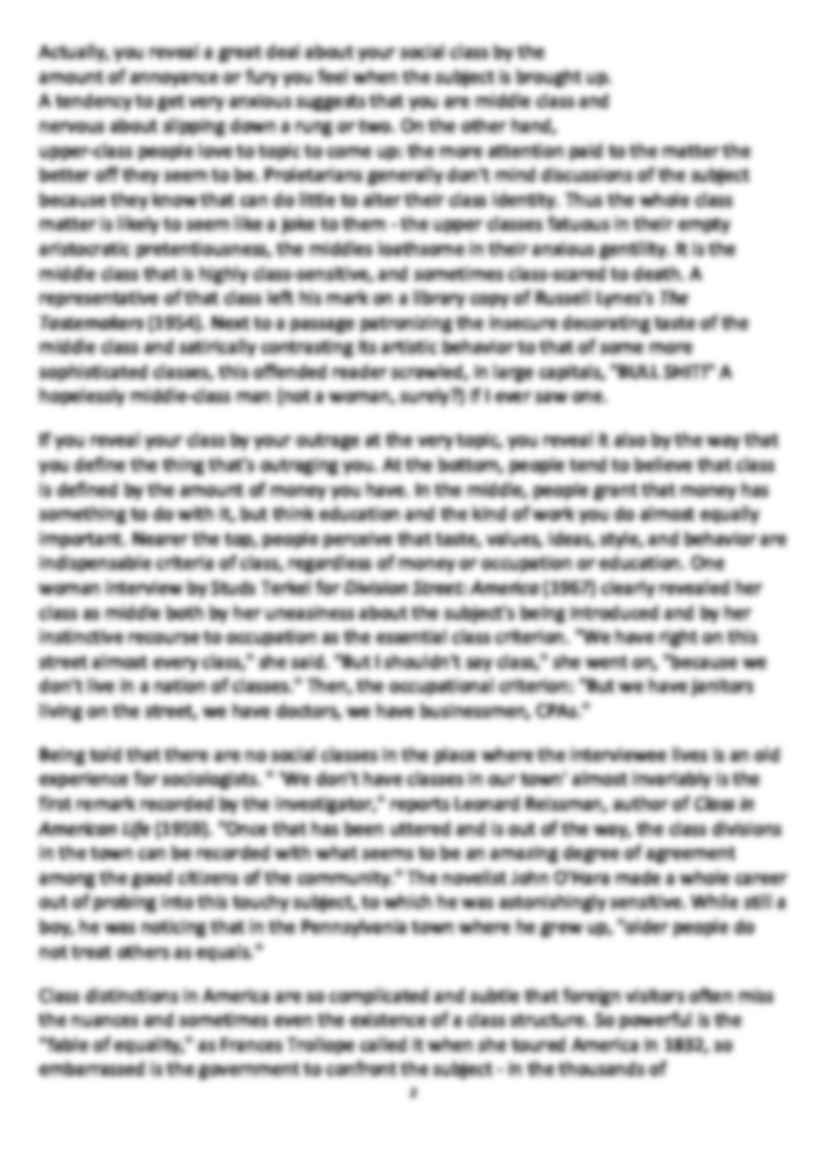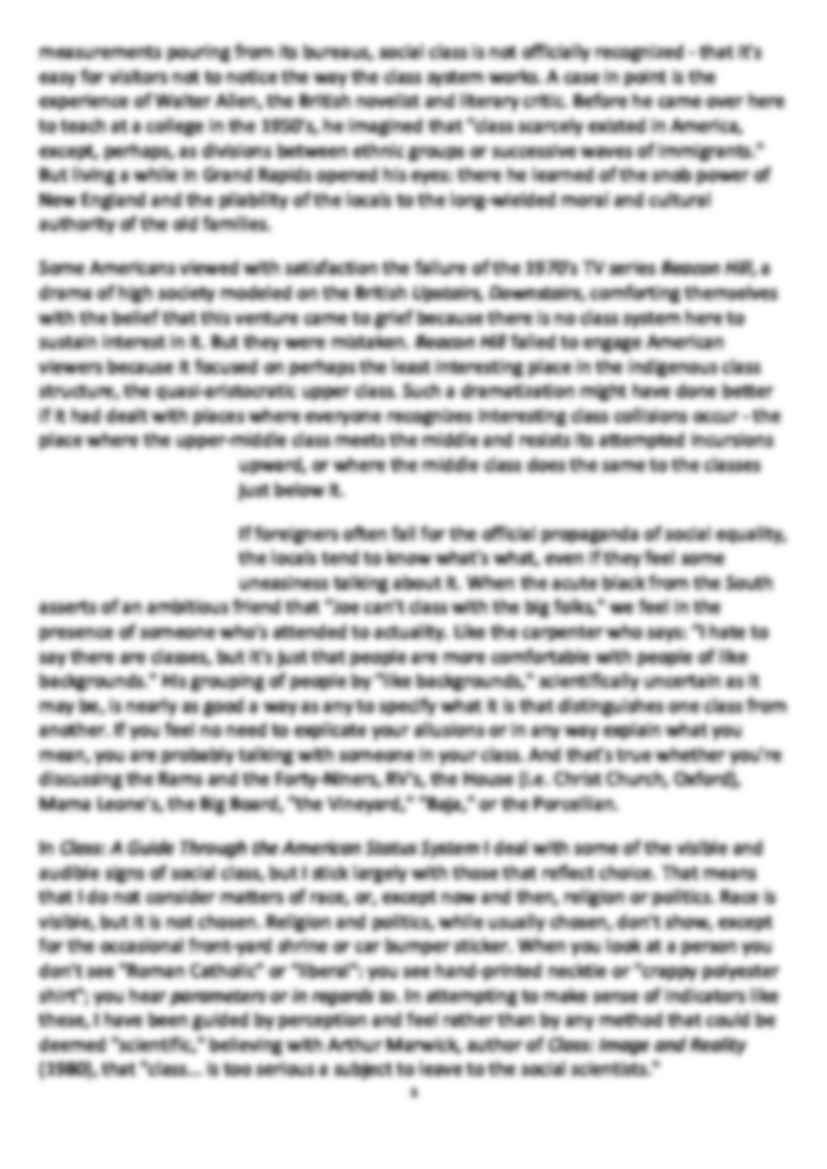


Fragment notatki:
Social class in the United States
Social class certainly exists in the United States, though it remains a controversial concept with many competing definitions.[1] Many Americans believe in a simple three-class model that includes the "rich", the "middle class", and the "poor". More complex models that have been proposed describe as many as a dozen class levels;[2][3] while still others deny the very existence, in the strict sense, of "social class" in American society.[4] Most definitions of class structure group people according to wealth, income, education, type of occupation, and membership in a specific subculture or social network.
A Guide Through the American Status System
by Paul Fussell. Reprinted by permission of the author. A Touchy Subject
Although most Americans sense that they live within an extremely complicated system of social classes and suspect that much of what is thought and done here is prompted by considerations of status, the subject has remained murky. And always touchy. You can outrage people today simply by mentioning social class, very much the way, sipping tea among the aspidistras a century ago, you could silence a party by adverting too openly to sex. When, recently, asked what I am writing, I have answered, "A book about social class in America," people tend first to straighten their ties and sneak a glance at their cuffs to see how far fraying has advanced there. Then, a few minutes later, they silently get up and walk away. It is not just that I am feared as a class spy. It is as if I had said, "I am working on a book urging the beating to death of baby whales using the dead bodies of baby seals." Since I have been writing this book I have experienced many times the awful truth of R.H. Tawney's perception, in his book Equality (1931): "The word 'class' is fraught with unpleasing associations, so that to linger upon it is apt to be interpreted as the symptom of a perverted mind and a jaundiced spirit." Especially in America, where the idea of class is notably embarrassing. In his book Inequality in an Age of Decline (1980), the sociologist Paul Blumberg goes so far as to call it "America's forbidden thought." Indeed, if people often blow their tops if the subject is even broached. One woman, asked by a couple of interviewers if she thought there were social classes in this country, answered: "It's the dirtiest thing I've ever head of!" And a man, asked the same question, got so angry that he blurted out, "Social class should be exterminated."
Actually, you reveal a great deal about your social class by the amount of annoyance or fury you feel when the subject is brought up. A tendency to get very anxious suggests that you are middle class and nervous about slipping down a rung or two. On the other hand, upper-class people love to topic to come up: the more attention paid to the matter the better off they seem to be. Proletarians generally don't mind discussions of the subject because they know that can do little to alter their class identity. Thus the whole class matter is likely to seem like a joke to them - the upper classes fatuous in their empty aristocratic pretentiousness, the middles loathsome in their anxious gentility. It is the middle class that is highly class-sensitive, and sometimes class-scared to death. A representative of that class left his mark on a library copy of Russell Lynes's
(…)
… Washington, D.C., as creatures "born to be slaves, and struggling to be lords." Thirty years later, in Democracy in America, Alexis de Tocqueville put his finger precisely on the special problem of class aspiration here. "Nowhere," he wrote, "do citizens appear so insignificant as in a democratic nation." Nowhere, consequently, is there more strenuous effort to achieve - earn would probably not be the right word - significance. And still later in the nineteenth century, Walt Whitman, in Democratic Vistas (1871), perceived that in the United States, where the form of government promotes a condition (or at least an illusion) of uniformity among the citizens, one of the unique anxieties is going to be the constant struggle for individual self-respect based upon social approval. That is, where everybody is…
… equality, I think everyone at some point comes to feel like the Oscar Wilde who said, "The brotherhood of man is not a mere poet's dream: it is a most depressing and humiliating reality." It's as if in our hear of hearts we don't want agglomerations but distinctions. Analysis and separation we find interesting, synthesis boring. Although it is disinclined to designate a hierarchy of social classes, the…
… up, mahogany is, if you like, "upper middle class," until we arrive, finally, at the apex: teak. In the army, at ladies' social functions, pouring the coffee is the prerogative of the senior officer's wife because, as the ladies all know, coffee outranks tea. There seems no place where hierarchical status-orderings aren't discoverable. Take musical instruments. In a symphony orchestra the customary…
… customarily played. As the composer Edward T. Cone says, "If you play a violin, you can play in a string quartet or symphony orchestra, but not in a jazz band and certainly not in a marching band. Among woodwinds, therefore, flute, and oboe, which are primarily symphonic instruments, are 'better' than the clarinet, which can be symphonic, jazz, or band. Among brasses, the French horn ranks highest because it…
... zobacz całą notatkę

Komentarze użytkowników (0)